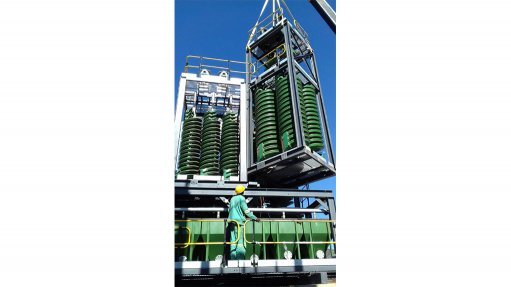
Experience in the field and in its test laboratory has allowed Multotec Process Equipment to prove the economic impact of applying spiral concentration technology to high value minerals used in cellular phones and electric cars.
“A number of customers mining minerals such as copper, lithium, tin and tantalite are already benefiting from using spirals to upgrade the value of their concentrate, either replacing their conventional processing technique or augmenting it,” says Graeme Smith, application engineer at Multotec Process Equipment.
Smith highlights the likely growth in the demand for these kinds of minerals, in line with the mass production of various electronic devices and the imminent prospects for electric car manufacture. Lithium is important to battery production, tantalite is used in resistors and capacitors, and copper and tin are key contributors to electroconductivity.
He says that spirals are proving their worth in helping producers become more efficient, potentially raising output levels while holding down the cost involved in downstream processing. This upgrading of the value of mined material also contributes to lower transportation costs and higher revenues earned.
Recent successes have been enjoyed by copper mines in the Democratic Republic of Congo, Zambia and Zimbabwe, where Multotec’s spirals are upgrading product from 1-3% run-of-mine to 20%-plus copper concentrate.
“These mines can achieve an upgraded product which can be sold as copper concentrate,” he says. “Spirals can also be applied as a bulk reduction strategy to achieve a higher-grade material for more efficient leaching.”
Working with tin producers in countries including Morocco, the DRC and Spain, Multotec spirals have been able to raise initial head grades of 1-3% to levels of over 50% tin in concentrate. Treating tantalite from a tailings operation in the DRC, spiral technology has performed massive bulk reduction and upgrading, while shaking tables clean the final product.
“This allows existing downstream processes to become more productive, and to ramp up production by maximising recoveries and reducing rand per tonne costs,” he says.
In test work in its extensive Spartan manufacturing and research facility near Johannesburg, Multotec has also succeeded in separating elements of lithium using spiral technology, aiming for 80% concentration of the element petalite.
Smith emphasises the value of the company’s experience in modular plants, allowing spiral applications to be conveniently containerised for transport to and commissioning at remote sites.
“Our mobile plants – capable of treating 20 tonnes per hour – can be moved in two standard containers – one of 12 metres in length and the other of 6 metres,” he says.